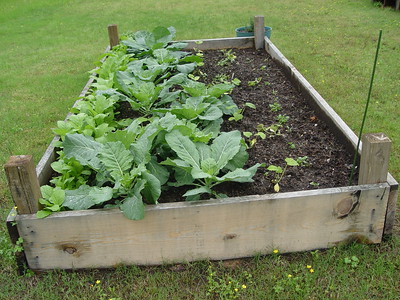Raised Bed Gardens
What are the benefits of having a raised bed garden?
Nashville, Ark. – Have you always wanted to have a garden, but your soil is just too
poor? Maybe your soil has poor drainage, little organic matter, is heavy with clay, or overloaded with rocks. An
option would be to build a raised bed garden. There are many different types of shapes
and sizes that you can choose from. Even if you have a limited number of tools at
home to build your own raised beds, do not mark it off the list.
drainage, little organic matter, is heavy with clay, or overloaded with rocks. An
option would be to build a raised bed garden. There are many different types of shapes
and sizes that you can choose from. Even if you have a limited number of tools at
home to build your own raised beds, do not mark it off the list.
One benefit to having a raised bed are that it allows you to rotate crops yearly, lessening a chance for fungal and bacterial disease to be found in your garden. Per Extension recommendations, you should only return to the original raised bed location after three years.
What are some things to consider before starting to work on your raised bed?
- How much are you are willing to spend on each bed?
- Where do you plan to put your bed? Being close to a water source and making sure the plants are getting plenty of sunlight is very important.
- How hot are the plants going to get? Raised bed are known to get warmer than gardens planted in a traditional garden.
- How many raised beds do you need? Figuring out how many raised beds to build and getting plenty of material to do so.
- What kind of building material do you need? If you choose to take on building your own bed. Be sure pick your lumber wisely. Cedar is a great option because it is considered naturally rot resistant. Say you go with untreated lumber, do not expect the bed to last as long as the cedar bed will. Many gardeners just choose to stay away from treated lumber because of the potential leaking that could take place. Although restrictions of chemicals used to treat lumber has been changed over the last few years, some gardeners still fear the worst.
If you do not feel like you are handy enough to build your own raised bed. No worries you can always decide on size and style and pick up a premade one. If you would like more information on types, designs, and assembly contact your local extension office.
By Samantha Horn
County Extension Agent - Agriculture
The Cooperative Extension Service
U of A System Division of Agriculture
Media Contact: Samantha Horn
County Extension Agent - Agriculture
U of A Division of Agriculture
Cooperative Extension Service
421 N. Main Nashville AR 71852
(870) 845-7517
shorn@uada.edu
The Arkansas Cooperative Extension Service is an equal opportunity institution. If
you require a reasonable accommodation to participate or need materials in another
format, please contact your County Extension office (or other appropriate office)
as soon as possible. Dial 711 for Arkansas Relay.
Pursuant to 7 CFR § 15.3, the University of Arkansas System Division of Agriculture
offers all its Extension and Research programs and services (including employment)
without regard to race, color, sex, national origin, religion, age, disability, marital
or veteran status, genetic information, sexual preference, pregnancy or any other
legally protected status, and is an equal opportunity institution.